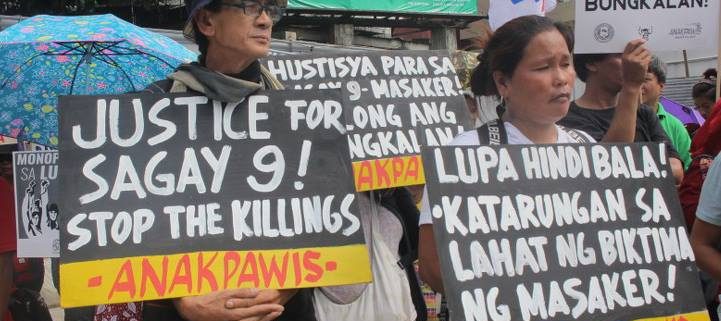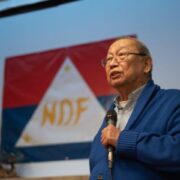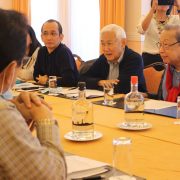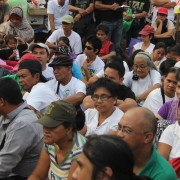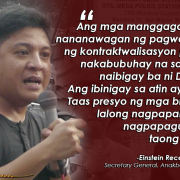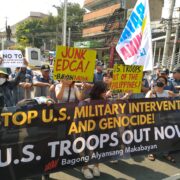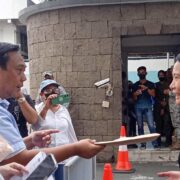NDFP: Sagay massacre shows evils of hacienda system
The National Democratic Front of the Philippines’ (NDFP) Reciprocal Working Committee on Social and Economic Reforms (RWC-SER) condemned the massacre of nine peasants, including two minors, in Sagay City, Negros Occidental Saturday night.
The group tasked to co-craft with its government counterparts free land distribution programs for poor farmers blamed the failure of the Government of the Republic of the Philippines (GRP) to implement social justice through genuine agrarian reform.
“The incident underscores the evils of the hacienda system,” NDFP RWC-SER chairperson Juliet de Lima said in a statement.
Nine farmers, including two minors, were fired upon by around 40 armed men at Hacienda Nene, Sagay City. They were subsequently shot on their heads and three victims’s bodies were burned by their killers.
Members of the National Federation of Sugar Workers, the victims started a land occupation campaign earlier to plant vegetables to tide them over the expected dead season of the sugarcane crops.
“As long as a handful of landlords monopolize land ownership and perpetuate their power through force, the Sagay 9 will not be the last victims of agrarian-related violence. Agrarian unrest will persist as the peasant masses continue to suffer from widespread poverty, high indebtedness, severe hunger and malnutrition,” de Lima added.
The NDFP RWC-SER also said President Rodrigo Duterte and the militarists in his cabinet have blood on their hands for terminating the peace negotiations that would have resulted in the adoption of the Comprehensive Agreement on Social and Economic Reforms (CASER)’s section on Agrarian Reform and Rural Development (ARRD).
“The draft ARRD, which was scheduled for signing last November before Duterte abruptly cancelled the peace talks provides for the free distribution of big landholdings and landed estates including lands targeted by the government for distribution, haciendas that are under the control of private individuals or entities, disputed lands with local agrarian reform and peasant struggles and lands already occupied by farmers through various forms of land cultivation and collective farming activities,” de Lima said.
“The break-up of land monopolies and free land distribution are the just, necessary and urgent corrective measures to the centuries-old social injustices suffered by the peasantry,” she added.
A day before the massacre, Duterte admitted in his speech that the Communist Party of the Philippines (CPP)-led revolution would not go away within his lifetime.
“When I die, the NPA (New People’s Army) will still be here. When Joma Sison dies, the NPA will still be here,” Duterte said, referring to the CPP founder and NDFP chief political consultant.
Sison for his part said Duterte is correct in saying that the NPA will continue to exist even after the professor and his former student are gone “…if by implication he means that the root causes of the armed conflict must be addressed and solved by social, economic and political reforms.”
“It is up to him to end his position of having terminated the peace negotiations with Proclamation 360. The standing policy of the NDFP is to negotiate with the GRP anytime he is ready to resume the peace negotiations in accordance with The Hague Joint Declaration and further agreements,” Sison said. # (Raymund B. Villanueva)

